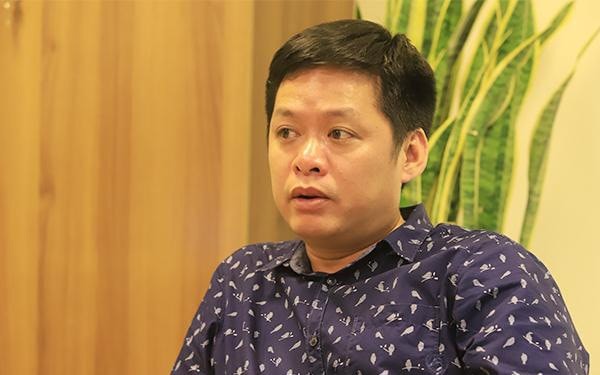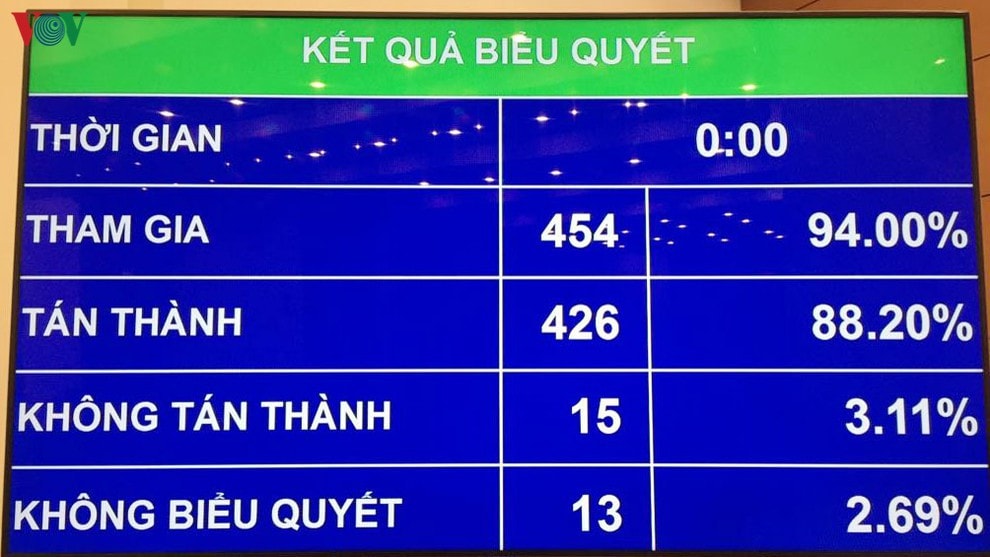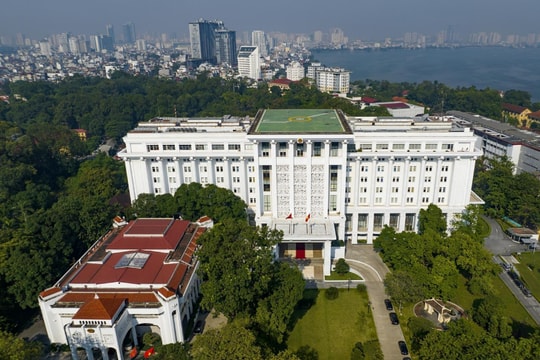Ministry of Interior talks about abolishing 'lifetime tenure' for civil servants
The more socialized the unit is, the more autonomous it is, so every unit wants to retain talented people.
The National Assembly has just passed the Law amending and supplementing a number of articles of the Law on Civil Servants and the Law on Public Employees. One of the notable contents is that from the time the law takes effect on July 1, 2020, all newly recruited civil servants will sign a fixed-term employment contract. For civil servants who were recruited before July 1, 2020, there is basically no change in the employment contract regime compared to the current one.
This information has caused quite a stir in the minds of salaried workers. The reporter had an interview with Mr. Nguyen Tu Long - Deputy Head of the Department of Civil Servants and Public Employees (Ministry of Home Affairs), the unit that drafted and submitted this bill to the Government and the National Assembly.
 |
| Mr. Nguyen Tu Long - Deputy Head of the Department of Civil Servants and Public Employees (Ministry of Home Affairs). Photo: Tran Thuong |
How to understand the phrase "officially abolish lifelong tenure for civil servants" correctly.
PV:Sir, how should we correctly understand the phrase "officially abolishing lifelong tenure for civil servants" that the press reported after the National Assembly passed the Law amending and supplementing a number of articles of the Law on Civil Servants and the Law on Public Employees?
Mr. Nguyen Tu Long: First of all, it is necessary to clearly understand that the goal of this policy is in accordance with the spirit of the viewpoints and directions of the 19th Central Resolution, which is:Implement a fixed-term civil servant contract regime for new recruits.(as of July 1, 2020 - PV)(except for public service units in remote areas, areas with especially difficult socio-economic conditions).
This policy comes from the reality that, although there are mechanisms and regulations to evaluate and eliminate civil servants and public employees, it seems that it has been very difficult to do so, and once you enter the State, you feel secure there.
Implementing the Central's direction, when developing this regulation, the Ministry of Home Affairs anticipated all the difficulties, obstacles, advantages and disadvantages of this content, situations that may arise in practice and reported very carefully to the Government. When the Government submitted and asked for opinions from the National Assembly, it proposed two different options, along with careful and specific analysis of the pros and cons of the content "signing a fixed-term contract for newly recruited civil servants after July 1, 2020".
The law has also anticipated and supplemented regulations to avoid as much as possible disadvantages, minimize administrative procedures, and minimize possible negative impacts, including issues that National Assembly delegates are concerned about, such as having to sign and re-sign contracts, which will make civil servants, especially teachers and psychologists, feel insecure at work, or the emergence of administrative procedures that can easily lead to negative impacts. For example, previously, the contract signing period was stipulated in the law to be from 12 to 36 months, but now the new law has increased it to 12 to 60 months. With a period of 5 years, it also creates peace of mind for civil servants.
The law also clearly stipulates and supplements the provisions on signing a contract with a fixed term that if the public service unit still has a need and the civil servant fully meets the provisions of the law and completes the task, the unit is required to continue signing a contract with that civil servant and is not allowed to discontinue the contract to recruit a new person.
I would like to reiterate that the regulation on signing a fixed-term contract only applies to new recruitments after July 1, 2020, the effective date of the Law. All staff recruited before July 1, 2020 will still be subject to the provisions of current law. The Law also has a transitional provision, that is, those who have been recruited and are performing a fixed-term contract but that contract extends past July 1, 2020 will continue to perform that contract until it ends. After that, if they are assessed as qualified, they will be able to sign an indefinite-term contract.
For civil servants working in remote areas, border areas, islands, etc., those recruited in these areas are signed with indefinite contracts. This is a mechanism to encourage competent people to work in difficult areas.
Evaluation by work results, specific products
PV:How will this amended and supplemented law contribute to solving the problem of cumbersome and ineffective administrative apparatus?
Mr. Nguyen Tu Long: For those who do not complete their tasks, do not have the capacity, qualities... which have long been called "stealing an umbrella in the morning and stealing it back at night", the 2008 Law on Civil Servants and the 2010 Law on Public Employees have a mechanism for elimination. In terms of the level of work completion, every 2 consecutive years of not completing tasks will be dismissed. For civil servants who do not complete their tasks, the public service unit has the right to unilaterally terminate the employment contract.
 |
| With 426/454 delegates voting in favor, the National Assembly officially passed the Law amending and supplementing a number of articles of the Law on Cadres, Civil Servants and the Law on Public Employees on the afternoon of November 25. Screenshot |
This is a challenge for us in the process of law-making because the fields and professions are very broad, the law cannot cover all. The results of completing the tasks of a teacher are different from those of a doctor, civil servants in the auditing industry are different from those in the transport industry... The law only provides principles, but what is important is that when guiding implementation, the Government, specialized management ministries as well as agencies directly managing and using civil servants and public employees provide a set of evaluation criteria suitable for their agencies and organizations. But the most important thing in evaluating cadres is still the impartiality and objectivity of the management leader.
Working in the public or private sector can contribute to society.
PV: LawHow to encourage workers to work effectively and retain talented people for the State?
Mr. Nguyen Tu Long: We are concerned with two aspects of one problem: eliminating civil servants and public employees who cannot do their jobs, do not properly perform their assigned duties and tasks, and attracting, creating peace of mind and stability for a team of truly competent and ethical staff, and attracting talented people from outside.
In the process of policy making, through research, we found that people with real expertise can live anywhere. Officials in the public or private sector can contribute to society, what we are most concerned about is the brain drain to foreign countries. If they remain in this country, regardless of their position, officials with capacity and professional expertise have the opportunity to contribute to the country and serve the people.
So how do we attract them? People with professional competence, the first factor to keep them is not material. What people need is an environment where they can confidently contribute and work, a healthy competitive environment. They probably do not need to get to this position or that position, but the important thing is that they are trusted and given the opportunity to demonstrate their full capacity and level.
The Government has already done this, has mechanisms and policies to attract talented people from outside; at the same time, it has promoted those who are currently working in agencies of the political system. The Law has also amended and supplemented the provisions in Article 6 that the State has a policy to attract talented people, assigning the Government to stipulate a policy mechanism framework to attract and promote talented people in public service activities.
Regarding civil servants, our point of view is that in an environment where socialization is increasingly high, the autonomy of units is also increasingly high, so if you have talent, any unit wants to retain it. Hospitals that want to have a brand must have good doctors, schools must have good teachers, and so the autonomy, self-determination, and self-management of the unit that uses civil servants are the deciding factors, and the law does not need to provide a specific mechanism. The team of civil servants just needs to make an effort and do their job well. Wherever there are good conditions, good treatment, and good response, you can absolutely go there.
PV:Public opinion believes that it is also necessary to abolish the form of "lifetime tenure" for all civil servants, especially civil servants in State administrative agencies at People's Committees at all levels, ministries, branches, and even for civil servants, is that right?
Mr. Nguyen Tu Long: Civil servants are the ones who exercise State power, the civil servant regime itself has many different models, but when exercising State power, one must have stability, which is the clearest distinction between the nature of civil servants' activities and the general labor force. Civil servants are people who do very specific jobs, which not only require capacity and qualifications but also dedication and continuity to ensure smooth administrative activities. Therefore, the biggest characteristic of their profession is stability, and stability is required to do these specific jobs. Imagine a civil servant who works here today and somewhere else tomorrow, or demands to move to a place with a high salary, then the administrative system certainly cannot be stable.
 |
| From July 1, 2020, all newly recruited civil servants will sign a fixed-term employment contract. Illustrative photo. |
That said, stability does not mean lifelong, nor does it mean there is no mechanism to eliminate those who do not meet the job requirements. Up to now, we have had a mechanism to eliminate civil servants who do not perform their jobs, but we have not done it all, not only because of the evaluation stage but also because we are still in the process of perfecting the institution. For example, to have a good evaluation, you must clearly define the job position, this content is also being built and perfected. To build a job position, the functions and tasks of each agency and organization must be relatively complete. And to have perfect functions and tasks depends on the organizational structure of the apparatus.
There are countries that take 10-20 years to build a job position system, even Vietnamese enterprises in the first transition process must also determine their functions, tasks, and purposes, then restructure the organization to perform those functions and tasks. From restructuring the organization, we can determine what kind of people are needed, where, and determine job positions. For the State as well, job positions are a very drastic content, along with that, the State apparatus is also being perfected in localities and ministries. Therefore, we need to look at it in a general way, solve everything gradually, and cannot immediately demand a perfect mechanism.
PV:Thank you.








